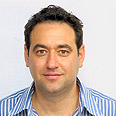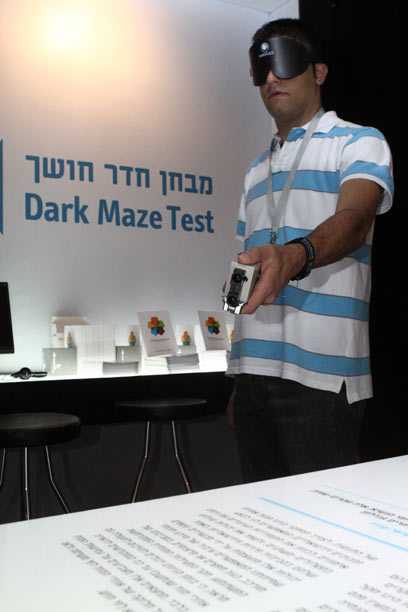
Dr. Amir Amedi
Yissum Research Development Company Ltd, the technology transfer company of the Hebrew University of Jerusalem presented a major new innovation – a virtual cane that will significantly improve the orientation and mobility of sight-impaired people.
Dr. Amir Amedi from the Institute for Medical Research Israel-Canada (IMRIC) and at Edmond and Lily Safra Center for Brain Sciences (ELSC) at The Hebrew University of Jerusalem and his team recently developed the device to help in spatial navigation for the blind.
The new device can assist blind people in estimating the distance and height of various obstacles. The invention was patented by Yissum, which is now seeking strategic partners for further development.
Touchword Puzzle
Author Avi Rubinstein designs special puzzle written in Braille, which allows blind people to solve game independently. 'If I wanted to solve a crossword puzzle in the past, I had to have someone read it to me,' says 26-year-old Yisrael Sofer
Unlike a white stick that can give the blind input from only a meter away, the device can function at a much shorter distance and up to some 10 meters in all directions. Dr. Amedi said the device can also distinguish between smiling and sad faces and can be used for research on how the brain flexibly changes upon receiving input and on brain reorganization in the blind.

The 'cane' in action (Photo: Ohad Zwigenberg)
Amedi added that the blind user functions like a dolphin or bat, with sonar-type signals reacting to surroundings.
The invention, which was unveiled at the Presidential Conference last week, functions as a virtual flashlight and can replace or augment the classic white cane. The virtual cane emits a focused beam towards surrounding objects, and transmits the information to the user via a gentle vibration, similar to a cell phone vibration.
A Yissum press release noted that the cane incorporates several sensors that estimate the distance between the user and the object it is pointed at. This allows the blind person to assess the height and distance of various objects, reconstruct an accurate image of the surroundings and navigate safely.
The virtual cane is extremely small, easy to carry, accurate, can function for up to 12 hours and is easy to charge. Using the device is highly intuitive and can be learnt within a few minutes.
Yaacov Michlin, CEO of Yissum said, "Dr. Amedi's promising invention can endow visually impaired people with the freedom to freely navigate in their surroundings without unintentionally bumping into or touching other people and thus has the potential to significantly enhance their quality of life."
Yissum is a Research Development Company of the Hebrew University and was founded in 1964 to protect and commercialize the Hebrew University’s intellectual property.
- Follow Ynetnews on Facebook















